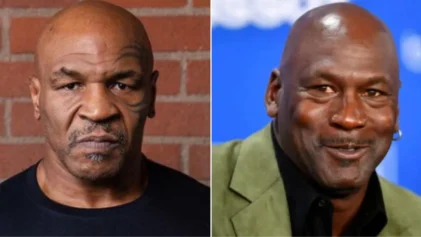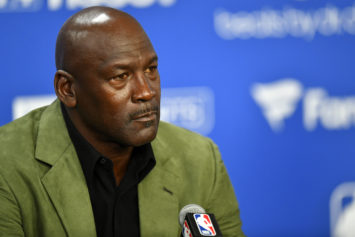It’s a picture as iconic as any taken of Michael Jordan, showing a side of the retired basketball legend seldom seen. He’d just won his first NBA title and is clearly spent, overwhelmed by emotion as he holds the championship trophy that had eluded him for nearly a decade.
As Jordan cradles the hardware, a familiar figure holds the Bulls superstar, a man who’d been by his side from the beginning: His father, James Jordan.
“I always felt, if he’d had to play that whole season for free to get to the mountaintop, he would have,” recalled the NBA’s official photographer, Andrew Bernstein, in an NBA.com interview ahead of receiving the Curt Gowdy Media Award in 2018. “I knew this was a special moment. I banged a couple of frames really quick.”
The elder Jordan’s murder in July 1993 impacted his son greatly, changing the course of his career in ways no one could’ve predicted. Two 18-year-old men were convicted of killing James Jordan. Police said James Jordan had pulled over on a highway to sleep in the red Lexus given to him by his son after leading the Bulls to a third consecutive title when he was shot in a robbery attempt gone wrong.
Now, retired Judge Gregory Weeks, who presided over that 1996 trial, has petitioned the state’s parole commission to release one of those men, Daniel Green, NBC is reporting. Co-defendant Larry Demery testified that Green pulled the trigger that fired the fatal shot. Demery pleaded guilty to first-degree murder, armed robbery and conspiracy to commit robbery, while Green was found guilty of murder during the commission of a robbery and conspiracy to commit robbery. Both men were sentenced to life in prison.
James Jordan’s body was found in a South Carolina swamp, identified through dental records. Green was later seen on video rapping while wearing an NBA All-Star ring and gold watch that Michael Jordan gave to his father.
But Green has insisted he didn’t kill the elder Jordan, though he did admit to helping dispose of the body.
“I had nothing to do with this man losing his life, period. I wasn’t connected to the murder. I came in after he was already dead,” Green said in a 2019 interview at the Lumberton Correctional Institution in Robeson County, North Carolina.
Green’s attorneys said they had evidence proving their client wasn’t involved in the murder. Whether that swayed Judge Weeks to petition for their client’s release is unclear; North Carolina parole commission hearings are closed to the public. NBC reached out to the judge and Michael Jordan but received no response.
After his father’s death, Michael Jordan shocked the sports world by quitting basketball, embarking on a journey to play baseball, a tribute to his late father, who had always dreamed of a big league career. Michael Jordan spent a year in the minors, at Double-A Birmingham, where he acquitted himself better than anyone could’ve expected.
But the court was where he belonged, and in March 1995 he returned to the NBA. The following season Jordan led the Bulls to their fourth championship. After the clinching game, he collapsed to the floor in the locker, in tears.
“I know he’s watching,” he said. “This is for Daddy.”
Jordan’s dad still figures prominently in the retired legend’s thoughts. In an interview on his 50th birthday, he lamented how “Pops” never met his then-fiancée Yvette Prieto or got to see his grandchildren grow up.
“He died in ’93. Jasmine was a year old. Marcus was 3 years old. Jeffrey was 5 years old,” Jordan said.
To this day he watches old Westerns obsessively, just like he used to with his father.
“The thing we’d do,” he says, “we’d stay up all night and watch cowboy movies.”
After James Jordan was murdered, Bernstein, the NBA photographer, got a phone call from Michael’s office requesting a print of his iconic snapshot.
“I was very close with my dad and Michael Jordan knew him — my dad was with me through the entire Dream Team experience (in 1992),” he said. ”And I knew his dad. So it was a poignant moment in my career to have him request that photo. If I had to pick one photo to put on my tombstone, this would probably be it.”

